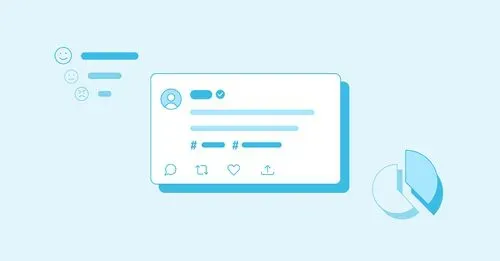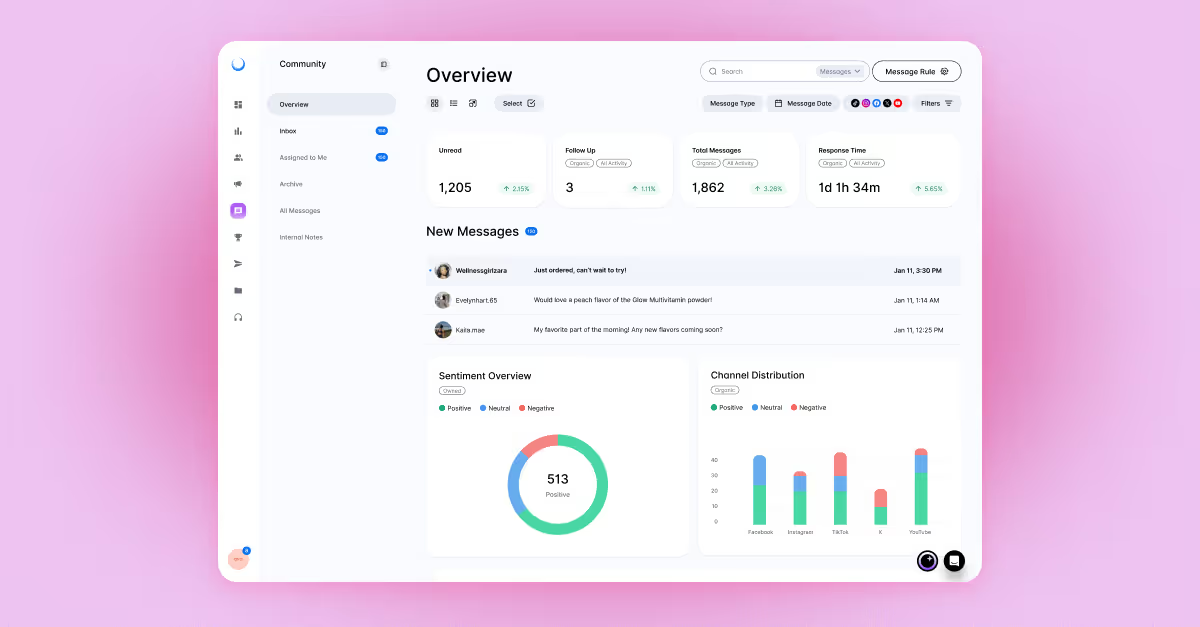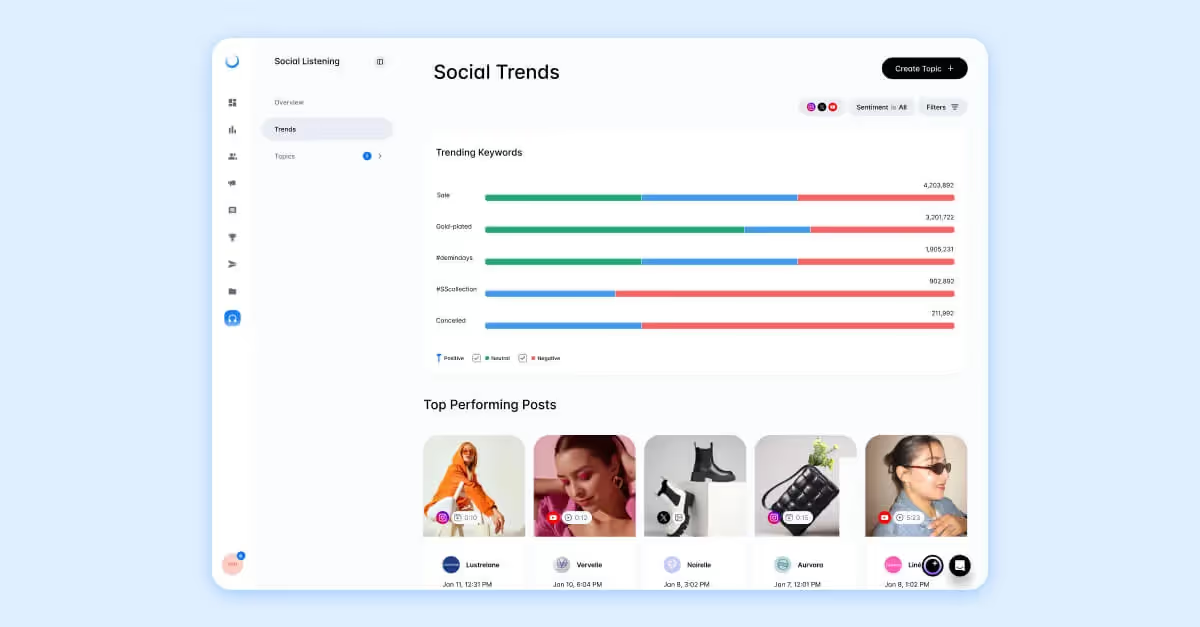The Complete Guide to Social Listening on Twitter (X)

Social listening is an essential part of any marketer’s toolkit. Not only can marketers find out what users say about their brand, but they can monitor what users say about competitors, and read unfiltered thoughts and conversations on their products.
Twitter (X) has 556 million active users — what do they have to say about your brand? More and more, users flock to social platforms for passive entertainment. While Twitter (X) can certainly entertain, its users still head to the community-based platform to connect and converse with others.
So how can brands harness social listening on Twitter (X) and incorporate it into their strategy?
What is Social Listening on Twitter (X)?
Social listening on Twitter (X) is when you monitor what users say about your brand on the platform — this can range from your brand name to specific keywords and phrases that are relevant to your brand.
Social listening on Twitter (X) can be done in a few different ways on the platform:
- Hashtags: Does your brand use its own hashtags, or notice that others are tweeting about your brand using a specific hashtag?
- Advanced Search: You can filter your searches by keywords (both ones to include and exclude), languages, accounts, and more.
- Lists: Sign up and monitor industry lists that might mention your brand or phrases relevant to your brand.
Why It’s Important for Brands to Use Social Listening on Twitter (X)
It’s easy to find yourself in an echo chamber when it comes to marketing — your team might believe wholeheartedly in a particular product or the brand overall, and while this matters, what’s important (and useful) is how existing and potential customers view your brand.
Social listening gives you insight into what you’re doing well, and which parts of your brand resonate well with your community, so you know what to build on and keep doing more of. It also gives you insight into online and offline mentions of your brand that customers won’t necessarily reach out with directly.
In addition to brand-specific insights, social listening also helps you monitor — and plan for:
- News and events
- Industry updates
- Competitors
- Influencer and brand ambassador opportunities
Negative sentiment is just as helpful — this provides insight into where your brand can improve, how marketing can help, and any pain points your entire team can work on. Brands can build from this and use sentiment analysis to dive deeper into how their Twitter (X) audience feels about the brand.
Social listening’s value doesn’t end there — it’s a useful counterpart to any CX integrations, so you can respond to user queries and questions quickly and effectively.
How to do Social Listening on Twitter (X)
So, how should brands actually conduct social listening on Twitter (X) to garner meaningful community feedback?
1. Set SMART Twitter (X) Listening Goals
Before you get into which keywords and phrases you’d like to monitor, it’s helpful to decide what goal you’d like to achieve. This could range from gathering feedback, staying atop trends, enhancing customer experience, competitive analysis, and gathering leads. These goals will inform what you monitor.
2. Decide Which Keywords and Phrases to Monitor
While monitoring your brand name might be a no-brainer, there will likely be other beneficial phrases to monitor. This could range from slogans, taglines, product names, positive or negative phrases, or even competitors. Brands might want to monitor mentions of their top competitors to benchmark themselves against — for example, “google vs yahoo”.
3. Open Advanced Search
Advanced search is the best way to ensure you maximize your chances of finding relevant mentions, and exclude any information that’s irrelevant to your search. For example, if looking for mentions of beauty products, you might want to exclude ‘hair’ and other relevant terms so you don’t see results that don’t necessarily matter to your brand. You can filter results on Advanced Search by:
- Accounts
- Hashtags
- Reply type
- Links or no links
- Engagement: Minimum replies, likes, and retweets
- Dates
4. Set Up TweetDeck Columns for Daily Monitoring
Using the parameters from the above step, set up columns in TweetDeck so you can easily monitor the terms you’re listening for each day.
5. Monitor and Analyze Results
The way your team monitors and analyzes social listening data might differ — some of the data that’s helpful to monitor and discuss include:
- Quantitative: How many mentions did your brand receive?
- Sentiment Analysis: Are brand mentions overwhelmingly positive, or negative?
- Industry Trends: Are we up to date with upcoming trends, or does your team need to pivot?
- Influencers: Are there new influencer partnerships to explore?
From there, you can devise some action items to incorporate into your marketing strategy.
Best Twitter (X) Social Listening Tools
So, what tools should marketers use to monitor Twitter (X)? These are some of the most widely used tools among marketers:
Twitter (X)
While the customization of columns in TweetDeck is powerful, the native platform and advanced search are helpful tools. According to Twitter (X), 50% of consumers talk about brands when sharing life updates, and 34% actually want to thank the brand. Brands would be remiss to avoid the platform entirely, especially when it comes to customer support.
With the right integrations, brands can use Twitter (X) to boost their customer support and respond to customers quickly, plus pull in important brand mentions.
TweetDeck
Long used as a scheduling tool by marketers, TweetDeck is now part of Twitter’s interface. While Twitter’s Advanced Search feature is useful for social listening, TweetDeck takes this a step further and lets you add columns for the terms you monitor, so you can simply hop on and monitor what’s going on rather than submit your unique search details each time.
While not the most traditional forum for Twitter (X) social listening, Reddit is a news aggregator — where many brands and news outlets use Twitter to share and collect news, you shouldn’t overlook Reddit for marketing. Reddit is a useful, unique, social listening tool for Twitter (X) content that some brands might not think to use.
The Social Intelligence Lab reports that 75% of marketers say forums and review sites are important for social listening, and 70% report that Reddit has grown in importance.
While the search capabilities aren’t as unique as Twitter (X), monitoring mentions, and shared Tweets on Reddit (a popular type of reposted content) can give you a leg up on competitors that might not have adopted Reddit yet.
Mention
One of the most well-known tools for social listening on Twitter (X), Mention helps brands monitor exactly that — who’s mentioned them on social, including Twitter (X). The platform is home to 1.4 trillion conversations, and can also pull in industry trends, and reports that explore opportunities for your brand.
Social Listening for Twitter (X) by Dash Social
Twitter (X) is one of the most valuable social media tools to gain insights and understand how your audience is feeling about your brand, products and competition. With Dash Social's AI-powered social listening tool for Twitter (X), you can now deeply understand the way users are communicating through images and visuals on the app and use it to lead your content strategy going forward.
FAQs
What is listening activity on Twitter (X)?
Listening activity on Twitter (X) details the Spaces you’re part of and have listened to — Spaces are live audio conversations hosted by users.
How do you socially listen on Twitter(X)?
You can socially listen on Twitter (X) using TweetDeck, and Twitter Search (including Advanced Search).
What is the difference between Twitter (X) and Tweetdeck?
The main difference between Twitter (X) and TweetDeck is that Twitter (X) is the actual platform, while TweetDeck was a third-party scheduler and search tool. While Twitter (X) has more features since it’s the native app, TweetDeck allows you to create columns based on custom searches — perfect for social listening.






